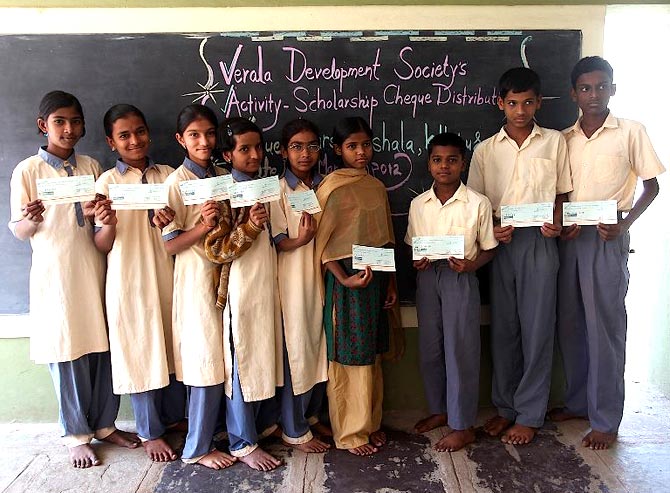 | « Back to article | Print this article |
This 26-year-old wants to reduce world poverty
American Indian Svetha Janumpalli aims to find an answer to global poverty through conditional cash transfer. Find out how she plans to go about it.
World's problems, we all know, have no easy solution.
A lot of different NGOs and social enterprises are trying to improve the world in different ways.
Some of them use methods which are able to enlarge their impact on a broader scale, and one such method is the Conditional Cash Transfer (CCT).
This programme aims to reduce poverty by making welfare programmes conditional upon the receivers' actions.
The government (or a charity) only transfers the money to persons who meet certain criteria.
These criteria may include enrolling children into public schools, getting regular check-ups at the doctor's office, receiving vaccinations, or the like.
CCT is unique in seeking to help the present generation in poverty, as well as breaking the cycle of poverty for the next through the development of human capital.
Although the programmes are, of course, not a panacea, they are able to generate full synergies between social assistance and human capital development only where the supply of health and education services is extensive and of reasonable quality.
CCT's programmes have been evaluated rigorously, especially in Latin America, and those evaluations revealed the effectiveness of the method for investing in the poor’s human capital.
We met one of the few organisations in the world working in a successful way with CCT, New Incentives, run by Svetha Janumpalli, a 26-year-old American girl of Indian origin.
After her graduation, she moved to Bangalore to do field research.
"I have been in India before since my father is originally from a small village in Andhra Pradesh, but working on the field was a great experience for me. I have always been passionate about microfinance and solving poverty issues, but studying the method and to see them in action is a completely different experience.
"After India, I had the chance to work with Grameen Bank in Bangladesh and as a policy intern at University of California at Berkeley Centre for Effective Global Action. There, among the different projects I was working on, I got to know about CCT and the model impressed me.
"I started researching about it, searching for organisations who were working on it. But I couldn't find anyone. So I decided to start something on my own," says Janumpalli.

Please click NEXT to continue reading...
'With an average of 9 dollars we're able to send kids to school for a month'
Janumpalli was 23 at that time, but her young age was not an excuse to not get things done.
"We started working on the ground with local partners who are helping us identify people we can help. We would check school attendance to understand if children attend school regularly, if they do then we send them money. With an average of nine dollars we are able to send kids to school for one month. We developed projects in India, Kenya, Cambodia and Nigeria," says Svetha.
But the beginning was not so easy, and a lot of mistakes were made.
"Initially, we made it too complicated. CCT is not so easy to explain and donors were not able to understand our message. Slowly, we changed our approach and tried to make it simple. Right now we are launching our new platform that will help us in this," adds Janumpalli.
Her story became an inspiration for a lot of young people.
She was covered in the Forbes, PartyCorps and Changemakers and was also featured on the stage during the Clinton Global Initiative in 2012.
"I know that from outside this can seems something big and difficult to achieve, but when you start working on it you understand how accessible they are. The secret is about networking with people in your community and get to know them better. Organically they will speak with others and help you connect with other people. Moreover, our story was very innovative and in a hot sector as CCT it helped us a lot in reaching more and more people," says the social entrepreneur.
'The biggest opportunity comes from the most unexpected places'
Their business model is very interesting.
"A minimum of 90 per cent of each dollar donated goes towards making a transfer. We give the remaining 10 per cent or more to our field partners who we contract to identify beneficiaries, verify conditions and disburse the transfers to households. For our structure and daily expenses we receive funds from Walton Family Foundation and other donors," she explains.
Having worked with different accelerators which were very useful in providing feedback, she has an interesting view about finding opportunities.
"I'm living in San Francisco and I can say that here the best opportunities can come from a random interaction in a coffee shop. Everything can be a good opportunity," shares Janumpalli.
Despite the success she had, she is a very humble girl ready to admit her mistakes and challenges.
"I made so many mistakes in the beginning. I was always thinking three steps ahead, but I missed the next thing and every time I had to reassess myself. But from those mistakes I learnt a lot. I learnt about the importance of testing and piloting before launching something and I learnt about the importance of asking for help. I didn't have any co-founder not because I didn't want one, but simply because I found people who were helping me for a limited amount of time and making the difference. Everyone should find as many people as possible to help," she adds.
New Incentives is just a young organisation that has its best times ahead.
"We want to become a point of reference in the CCT sector and continue to develop expertise in this field challenging ourselves. That's my passion and I really want to make it big," says Svetha. Her proactivity and her desire to help people is what brought her success and she has some good advice for people who would like to start-up.
"E-mail everybody to tell about your idea and to test your idea. You need as many feedback and suggestions to make your project perfect. Remember the biggest opportunity always comes from the most unexpected places," she sums up.


